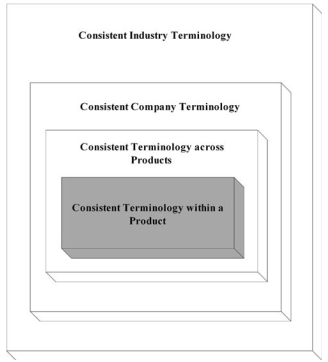- 签证留学 |
- 笔译 |
- 口译
- 求职 |
- 日/韩语 |
- 德语
A company that uses clear, consistent terminology is more likely to be trusted by customers and partners. If customers see that a company is consistent on the outside, they are more likely to believe that company is detail-oriented on the inside. Consistent terminology also demonstrates a commitment to and focus on the user. Trustworthiness is especially important today given the widespread dissatisfaction with spam, pop-up windows, viruses, and other security- and privacy-related threats. Anything that a company can do to support its trustworthy reputation is important.

Figure 1. Potential cumulative effects of terminology management.
Figure 1 shows the cumulative effects of source-language terminology management in the software industry. By creating a cross-company standard terminology set, a software company is taking the first step toward being able to participate in cross-industry terminology standardization. It is also a step towards creating a more user-friendly and trustworthy industry.
The benefit of terminology standardization across the software industry would extend to developers and IT professionals who develop third-party software or software in mixed operating system and application environments. Terminology standardization would allow these software creators to more quickly and easily create products that are easily used and localized. Currently this is not the case. For example, if Microsoft's terminology is not standardized, and third-party vendors who are building applications to run on Microsoft software mimic Microsoft terminology choices, those third-party companies multiply the chaos. This issue is actually well known enough to be parodied on the Internet.
责任编辑:admin
